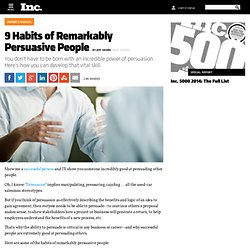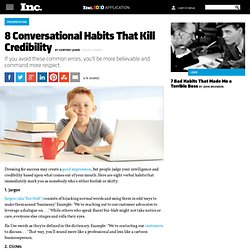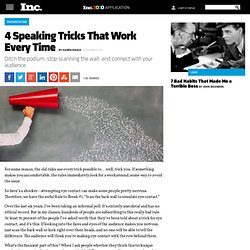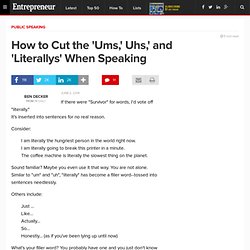

How to Make Sure Your Accent Won't Ruin Your Career. Share Tweet Email.

How to Speak as a Leader: The Power of Performance. Do you employ the power of performance when you take the stage?

Here's how to achieve true leadership in your next high-stakes speech or presentation. Leadership is performance. And nowhere is this truer than in public speaking. In the drama observed by stakeholders in your organization or industry, you have the starring role. The most successful leaders have an intuitive sense of theater, performing many roles and convincing others to play their parts. How to Improve Your Business Voice for Presentations. How well does your voice sound during a business presentation?

If you’re not satisfied with how you pitch your message, neither are your listeners. In fact, a recent research conducted by Quantified Impressions, a communications analytics company, showed that the sound of a person’s voice strongly influences how they’re seen. The corporate world accentuates a hustle and bustle of daily conversations, from business meetings to project planning, client negotiations and the like. This is why a strong and confident voice helps portray a professional image.
Non-verbal cues such as body language, gesture, and posture only reinforce what you say. The power of the professional speaker's pause. Effective Public Speaking. 5 Secrets of Powerful Speakers. Here are five principles that seem to guide the great speakers I've seen recently, whether they're talking about a vision for the company or the rollout of a new ad campaign.

It's interesting that three of the five secrets I'm looking at are counter-intuitive--for example, did you know that a great grabber may not be the best opening for your talk? Instead, you should start by answering one three-letter question. Two of the principles require you to reach inside before you reach out to listeners--it seems if you don't believe in your message, no one will. 1. Answer the question, "Why? " Public speaking tips. It’s no secret that public speaking strikes terror into many a heart.

For some, even piping up at a meeting can induce anxiety. Bill Hoogterp, co-founder of Own the Room, has made it his goal to attack this scourge. Hoogterp, 52, began his career in the nonprofit world, and his sense of mission endures. His firm trains executives at companies like Facebook, Siemens, Visa, and Time Inc. Public Speaking 101: How To Wow An Audience. Late Night's Seth Meyers's Top Interview Tips. 9 Habits of Remarkably Persuasive People. Show me a successful person and I'll show you someone incredibly good at persuading other people.

Oh, I know: "Persuasion" implies manipulating, pressuring, cajoling … all the used-car salesman stereotypes. But if you think of persuasion as effectively describing the benefits and logic of an idea to gain agreement, then everyone needs to be able to persuade--to convince others a proposal makes sense, to show stakeholders how a project or business will generate a return, to help employees understand the benefits of a new process, etc.
That's why the ability to persuade is critical in any business or career--and why successful people are extremely good at persuading others. Here are some of the habits of remarkably persuasive people: 1. You would assume data and reasoning always win the day, right? Nope. In fact, we prefer advice from a confident source even to the point that we will forgive a poor track record. So be bold. 8 Conversational Habits That Kill Credibility. Dressing for success may create a good impression, but people judge your intelligence and credibility based upon what comes out of your mouth.

Here are eight verbal habits that immediately mark you as somebody who's either foolish or shifty: 4 Speaking Tricks That Work Every Time. For some reason, the old rules use every trick possible to...well, trick you.

If something makes you uncomfortable, the rules immediately look for a workaround, some way to avoid the issue. So here’s a shocker--attempting eye contact can make some people pretty nervous. Therefore, we have the awful Rule to Break #1, “Scan the back wall to simulate eye contact.” Over the last six years, I’ve been taking an informal poll. It’s entirely anecdotal and has no official record. What’s the funniest part of this? It all goes back to making an authentic connection with the audience. Tasty metaphors spark brain's 'emotional centers' We’re so used to metaphors about tastes that when we hear a kind smile called “sweet” or a nasty comment called “bitter,” the descriptions almost seem literal.

New research shows that taste-related metaphors actually engage the emotional centers of the brain more than literal words with the same meaning. A new study in the Journal of Cognitive Neuroscience is the first to experimentally show that the brain processes these everyday metaphors differently than literal language. In the study, participants read 37 sentences that included common metaphors based on taste while the researchers recorded their brain activity. Each taste-related word was then swapped with a literal counterpart so that, for instance, “She looked at him sweetly” became “She looked at him kindly.”
Interestingly, the metaphorical and literal words only resulted in brain activity related to emotion when part of a sentence, but stimulated the gustatory cortices both in sentences and as stand-alone words. Julian Treasure: How to speak so that people want to listen. 10-things-speakers-should-never-say-th. How to Cut the 'Ums,' Uhs,' and 'Literallys' When Speaking. If there were "Survivor" for words, I'd vote off "literally.

" It's inserted into sentences for no real reason. Consider: I am literally the hungriest person in the world right now. I am literally going to break this printer in a minute. The coffee machine is literally the slowest thing on the planet. Sound familiar? Others include: Just … Like… Actually… So… Honestly… (as if you've been lying up until now) What's your filler word? Bad Speech Habits.